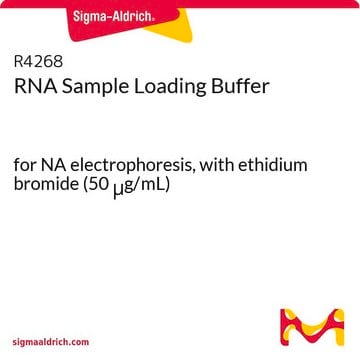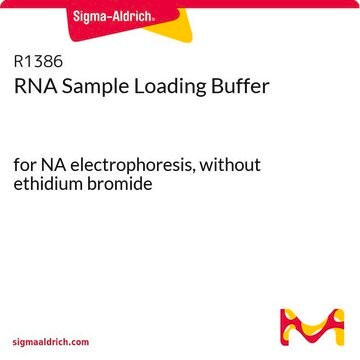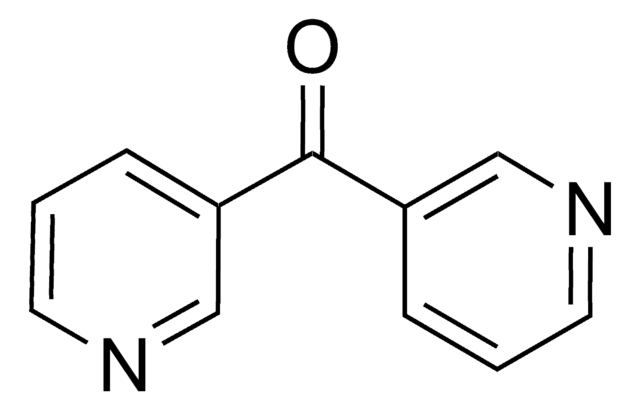G7654
Gel Loading Solution
for NA electrophoresis, solution
Synonyme(s) :
DNA Gel Loading Solution, Gel Loading Buffer
Se connecterpour consulter vos tarifs contractuels et ceux de votre entreprise/organisme
About This Item
Code UNSPSC :
12161703
Nomenclature NACRES :
NA.25
Produits recommandés
Qualité
for molecular biology
Niveau de qualité
Forme
solution
Concentration
6 ×
Température de stockage
2-8°C
Description générale
Gel loading solution is used as a tracking dye during electrophoresis. The dyes have a slight negative charge and will migrate the same direction as DNA, allowing the user to monitor the progress of molecules moving through the gel. The rate of migration varies with gel composition. Dilute 1:6 with sample before loading.
Application
Suitable for use with agarose or non-denaturing polyacrylamide gel electrophoresis (PAGE), which may be part of Northern and Southern blot hybridization procedures.
Composants
Gel loading buffer contains 0.25% bromophenol blue, 0.25% xylene cyanol, and 40% sucrose.
Autres remarques
Band migration can be expected as follows:
On polyacrylamide gels, xylene cyanole comigrates with approximately 450-460 bp DNA, while bromophenol blue comigrates with 15-100 bp DNA. On 0.5 – 1.4% agarose gels, xylene cyanole comigrates with 4 kb dsDNA, while bromophenol blue comigrates with 300 bp dsDNA.
On polyacrylamide gels, xylene cyanole comigrates with approximately 450-460 bp DNA, while bromophenol blue comigrates with 15-100 bp DNA. On 0.5 – 1.4% agarose gels, xylene cyanole comigrates with 4 kb dsDNA, while bromophenol blue comigrates with 300 bp dsDNA.
Produit(s) apparenté(s)
Réf. du produit
Description
Tarif
Code de la classe de stockage
12 - Non Combustible Liquids
Classe de danger pour l'eau (WGK)
WGK 2
Point d'éclair (°F)
Not applicable
Point d'éclair (°C)
Not applicable
Certificats d'analyse (COA)
Recherchez un Certificats d'analyse (COA) en saisissant le numéro de lot du produit. Les numéros de lot figurent sur l'étiquette du produit après les mots "Lot" ou "Batch".
Déjà en possession de ce produit ?
Retrouvez la documentation relative aux produits que vous avez récemment achetés dans la Bibliothèque de documents.
Les clients ont également consulté
Sambrook, J., et al.
Molecular Cloning: A Laboratory Manual, 6-6 (1989)
David R Macinga et al.
Antimicrobial agents and chemotherapy, 47(8), 2526-2537 (2003-07-25)
We have characterized an early series of 5,6-bridged dioxinoquinolones which behaved strikingly different from typical quinolones. The 5,6-bridged dioxinoquinolones inhibited Escherichia coli DNA gyrase supercoiling activity but, unlike typical quinolones, failed to stimulate gyrase-dependent cleavable complex formation. Analogous unsubstituted compounds
M K Bolla et al.
Journal of lipid research, 40(12), 2340-2345 (1999-12-10)
The apoE gene exhibits two common polymorphisms that have been associated with both coronary artery disease and Alzheimer's disease. The polymorphisms create the three allelic isoforms E2, E3, and E4 which are encoded by Cys;-Cys, Cys;-Arg, and Arg;-Arg at amino
S Henry et al.
Vox sanguinis, 70(1), 21-25 (1996-01-01)
While screening Le(a+b+)Polynesian DNA samples for a candidate Se(w) allele, a point mutation (C571-->T) resulting in a new stop codon (Arg191-->stop) in the alpha(1,2)fucosyltransferase gene (FUT2) was identified. This point mutation resulted in the gaining of a new restriction enzyme
Jung-Lim Lee et al.
Journal of microbiological methods, 67(3), 456-462 (2006-12-22)
Ethidium bromide monoazide (EMA) was utilized to selectively allow conventional PCR amplification of target DNA from viable but not dead cells from a broth culture of bacterial mixed flora derived from cod fillets. The universal primers designated DG74 and RW01
Notre équipe de scientifiques dispose d'une expérience dans tous les secteurs de la recherche, notamment en sciences de la vie, science des matériaux, synthèse chimique, chromatographie, analyse et dans de nombreux autres domaines..
Contacter notre Service technique












